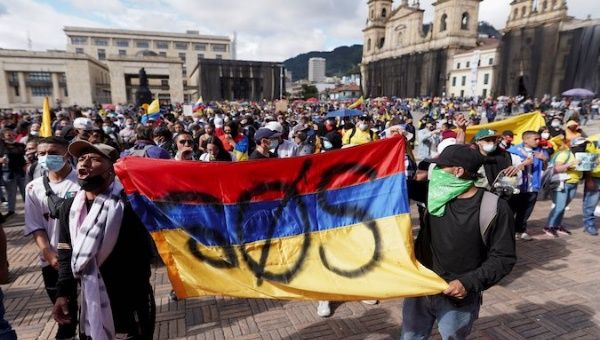Inter-American Commission on Human Rights Visits Colombia
A human rights observation mission will analyze cases of police violence amid nationwide protests destabilizing the country since Apr. 28.
A human rights observation mission will analyze cases of police violence amid nationwide protests destabilizing the country since Apr. 28.
On Tuesday, a mission from the Inter-American Commission on Human Rights (IACHR) will start an official visit to Colombia to analyze human rights violations committed by the Military Police (ESMAD) amid nationwide protests whipping the country since April.
RELATED:
Colombia: At Least 3,789 Police Brutality Cases Since April 28
The mission will analyze denunciations of excessive use of force, forced disappearances, eye injuries, sexual and gender-based violence committed by ESMAD officials.
After meeting with representatives of the Colombian government on Monday, the IACHR mission will interview victims in Bogota and Cali until June 10 to later present a report.
More than 650 civil society organizations have denounced the lack of independence in the country's judicial and control bodies while urging IACHR to condemn strongly the indiscriminate repression against protesters.
Even if the observation mission can only issue recommendations to President Ivan Duque's government, some of the human rights violations cases could escalate to the IACHR floor, if the victims decide to pursue this process.
Since April 28, when the national strike began, thousands of people have taken to the street in Colombia and other countries to condemn police brutality and Duque's attempts to install neoliberal policies on tax collection and the health sector amid the COVID-19 pandemic.
The National Strike Committee (CNP) has recorded 3,800 cases of violence against peaceful demonstrators, over 60 homicides, 1,600 arbitrary detentions, 65 cases of eye injuries, and more than 20 sexual assaults against women.
Human Rights Mission Confirms Police Abuses In Colombia
An international mission called on President Duque to safeguard the people's life and dignity, guarantee justice and truth, and comply with human rights laws.
An international mission called on President Duque to safeguard the people's life and dignity, guarantee justice and truth, and comply with human rights laws.
After two weeks of investigations, the International Mission of Solidarity and Human Rights Observation confirmed the Colombian people are victims of State terrorism and urged President Ivan Duque to be investigated for murdering and disappearing protesters.
RELATED:
In a preliminary report, the Mission called on Duque to safeguard the people's life and dignity, guarantee justice and truth and comply with human rights laws.
"During the national strike, the National Police disappeared, murdered, tortured, abused, persecuted, threatened, and intimidated protesters. Police brutality prevented and limited the people's political participation and right to protest," the report states.
The Mission also found that the government deployed sophisticated and lethal weaponry, which turned the country into a warlike zone.
"Duque targeted the people as an enemy, even when protesters were mostly youth, students, women, LGBTQ community members, farmers, Indigenous people, Afro-descendants, social leaders, human rights defenders, and journalists," it said.
The Colombian people "must obtain integral reparation from the government through truth and justice," human rights advocates assured.
The Mission that arrived in Colombia on May 25 is formed by representatives of organizations such as Peace and Justice Service (SERPAJ), Coordinating Committee against Police and Institutional Repression (CORREPI), and the Permanent Assembly for Human Rights (APDH).


No comments:
Post a Comment